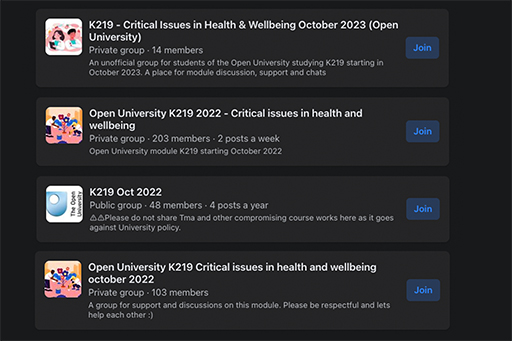1.3 Facebook groups
Anyone, including you, can start a Facebook group. Groups can be limited to the network of students on your module, course, or institution, and the admins of the group can choose how public it is. Figure 3 has two key tips.
When you join Groups, or think about creating one of your own, it is important you understand the different types of Group that exist. Click through Figure 4 to find out more.
Activity 1 Applying knowledge of Facebook groups to educational scenarios
a.
Public Group
b.
Closed Group
c.
Secret Group
The correct answer is c.
Discussion
- Public Group: This is incorrect, a Public Group will allow anyone to join and you may end up with people in your Facebook group who are involved in another working group, or people who are not associated with the group work but who will disrupt or confuse the work you are completing.
- Closed Group: This type of Group could work, but as the Group is called something associated with your module, other students will be able to find the Group and there is a danger you could end up with members from another working group.
- Secret Group: This type of Group would work best here, it would allow you to only make the Group visible to a list of students that you determine.
A Facebook group is a good way for team members working on a project together to communicate with one another efficiently. By creating a Group, you are effectively creating a private forum to share ideas on the project and post updates. Note that not all students want to join Facebook and you may exclude some members this way.
Here are some Facebook groups that came up in a search for the Open University module K219 in 2023. Can you identify what type of Group the following pages are?
You are a student on this module and want to join the Group for the academic year 2022/23 in which your posts will not be visible to the tutor. Which would you join?
Comment
There are 4 Groups listed here. The top Group appears to be for those students who will start in 2023. One of the Groups is set to public, so you may choose to join one of the other Groups that is set to private. As you can see there is not a lot of information here to help guide your decision except the number of students in the Group.
As you saw in this activity there are sometimes many Groups, even for an individual academic cohort of students. This is because there are no restrictions on who can set up an unofficial Group like this. Watch this video from Cath Brown from The Open University as she describes her hints and tips for engaging in Facebook groups.

Transcript: Video 2 Hints and tips
Another thing that Cath Brown talks about is that group size is important, here she talks about the problems of big Facebook groups and how to manage them.

Transcript: Video 3 Big groups and tensions
The whole group size is interesting. There are some areas where it doesn’t work if the group is too large. If you’re about to share something really personal, then you don’t want to be doing it in a group of 30,000 people. But I think to make the big groups work, I do think that you need to have... really good admins and you need to have a really good team of admins because no one can keep an eye on a huge group all the time. I think sometimes knowing when not to post is quite important if things do get a little bit negative, that it can be really tempting to jump in there and get annoyed by whatever these people are saying and that sort of thing. And I’m not going to pretend I’ve never succumbed to that temptation.
But I think as you carry on in the group, you kind of learn a little bit about, okay, I’d like to say this. Is this in any respect going to make things better if I do say this? I mean it’s a bit the equivalent of there are some emails that you don’t send immediately, that you kind of write the email but you don’t send it to the person because actually it’s not going to be very helpful. And I think doing that sort of thing on social media can be helpful too.
The other thing I think is even if you think someone is being unreasonable, at least acknowledging that you understand they’re upset. that if you just go straight in and imply you don’t think they should be upset or annoyed or whatever, then they’re just going to bite back at you. Whereas if you can acknowledge that they’re upset and say, I get it’s really frustrating, but you know, these are one of the reasons why it happens and I hope it gets resolved for you, then they’re probably more likely to take it on board than if you just go in straight off saying, well, they can’t possibly do that.
So I think that does tend to help. I think the other thing sometimes is about... and I know this sounds obvious but try not to take things personally and it’s a bit insulting if I’m comparing adults to little kids but in this respect it works if a toddler shouts I hate you mummy you don’t take it personally you don’t think the toddler really hates you and we adults act like that sometimes as well. We’re stressed, we’re unhappy, and we kind of go, nya, at someone when we’re unhappy. But it doesn’t mean that we’re actually that annoyed with that person or anything like that. I think remembering that can be useful as well.
And the other one, of course, is if it is getting to you, step away. I think there’s... One of the big groups I’m involved in here, the other thing that’s quite interesting as well as the admin team is there are a number of people who I might say are long-term contributors in that group. And by and large, those people tend to have, enjoy a certain amount of respect for quite a lot of the other contributors. And I know sometimes if I’ve not been sure about what I’m saying, I talk to other long-term people and say, okay, I really want to say this. is this going to just make things go sky high? And if they say no, Cath, that’s a really bad idea, don’t say it, then I will tend to listen to them.

